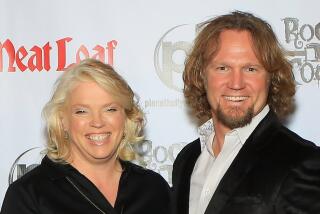Myth Museum : His Rhymes Tell of Times: Burma Shave
- Share via
SAN FRANCISCO — Bertram Minkin knows . . .
That where . . .
He goes . . .
Nostalgia always . . .
Seems to flow.
Burma Shave.
Minkin has recently opened a stage show featuring his memorized collection of all 600 rhymes used by Burma Shave on roadside signs of yesteryear.
Minkin has brought his “Burma Shave Man” show to the Museum of Modern Mythology, a 5-year-old institution that houses examples of such advertising giants as “Snap! Crackle! Pop!”; Buster Brown and his dog, Tige, and the Jolly Green Giant.
Playing the fictional Burma Shave Man, Minkin tells of his life as an advance man for Burma Vita Co., recounting such tough tasks as talking farmers into letting the company use prime stretches of land for its signs.
No Country Bumpkin
The Burma Shave Man, with his twangy drawl, is a sort of tonsorial Will Rogers, but Minkin is no bumpkin. The 36-year-old Oakland storyteller has a bachelor’s degree in classical literature and a master’s in rhetoric.
“Those signs say a lot about the America of old,” he said. “You read these signs and it’s easy to imagine the family out on the road, the kids begging dad to drive faster, faster, so they can read the next jingle.”
Minkin invites the audience to recite their favorite signs during the show. “It’s part of their childhood,” he said.
One of his favorites came from a women in her 80s:
“Past / Schoolhouses / Take it slow. / Let the little / Shavers grow.
“Burma Shave.”
$100 Per Jingle
Minkin said that each year Burma Vita Co. sponsored a contest in which $100 was paid for every jingle used. The jingle had to be six lines long--one line on each sign--the last line always plugging Burma Shave.
From the mid-1920s to the early 1960s, 7,000 sets of signs pushed the slick shaving cream.
The signs helped Burma Vita make an annual $3.5-million profit in the 1930s and ‘40s, but the company eventually fell behind Colgate, Palmolive and Barbasol. In 1963, it was sold to Philip Morris. The signs were gone within two years, victims of freeways and faster speeds.
As an indication of the signs’ importance in the annals of Americana, the Smithsonian displays this set:
“In this vale / Of toil / and sin / Your head goes bald / But not your chin.
“Burma-Shave.”
Hunters exacted a heavy toll on the signs, and horses were hard on them, too, according to Minkin.
“Old Dobbin found the sign’s 9-foot height was perfect for back scratching,” Minkin said.
One series of signs read:
“Old Dobbin / Reads these signs / Each day. / You see, he gets / His corn that way.
“Burma Shave.”
More to Read
The biggest entertainment stories
Get our big stories about Hollywood, film, television, music, arts, culture and more right in your inbox as soon as they publish.
You may occasionally receive promotional content from the Los Angeles Times.










